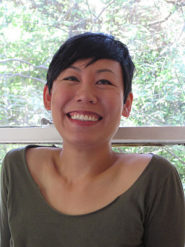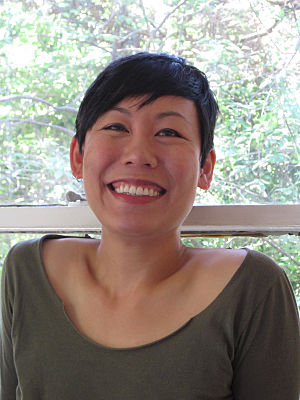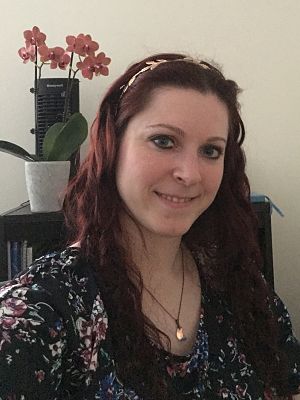Litdish: Nancy Au, Author

Nancy Au‘s writing appears or is forthcoming in Gulf Coast, The Cincinnati Review, Michigan Quarterly Review, Catapult, Lunch Ticket, and SmokeLong Quarterly, among others. She has an MFA from San Francisco State University where she taught creative writing. In the summers, she teaches creative writing (to biology majors!) at California State University Stanislaus. She is co-founder of The Escapery (https://theescapery.org). Her flash fiction is included in the Best Small Fictions 2018 anthology and she was the winner of The Vestal Review’s 2018 VERA Flash Fiction Prize. Her full-length collection, Spider Love Song & Other Stories, is forthcoming from Acre Books (University of Cincinnati) in 2019.
The following is a series of questions Nancy answered via email.
1. What’s your writing practice like?
Here is my lock-step narrative answer to your awesome question: I write for as short as a frenzied five-minute journal entry or up to three hours of nonstop typing in my laptop. For the longer writing times, I’ll select about 6-7 of my favorite books of the moment, and then set myself up either on the sofa or at my desk, which are both in the quietest corner of my home. I then pick one of the books and thumb through it until I come across a passage or a sentence or a single word that triggers my imagination. And then, if I’m starting a new project, I’ll simply begin to write without really thinking about what I’m writing and using that passage or sentence or word as my starting point. Those first few pages are always nonsensical and garbled. Sometimes it’s just a drawing/sketch in my notebook! I learned from my first writing teacher (the fabulous writer and editor, Peg Alford Pursell) to pay attention to my breathing, my body position, the way that my back and hands and neck feel when I am writing “on a roll,” when the words are flowing. I equate this to the way that I train for a marathon hike, teaching my body to recognize when I am “warmed up” and in a creative mind-space. So then when I experience these moments again, I know to push past the distractions (falling into a Wikipedia wormhole, or answering a text on my phone, or checking my email, etc.), and to flex those warmed-
up muscles and keep writing writing writing!
2. How do you manage writing with all your other responsibilities? (like day job,
family, social life, etc.)
I wish that I had a great answer for this question! Haha! My writing schedule varies so so so much. It’s often based on the projects that I am working on, or whether I am actively attending workshops, or working on pieces for specific journals or literary readings, or teaching, or if it’s raining, or if it’s sunny and perfect hiking weather, or if I’m feeling upbeat, or if I’m feeling blue. But, logistically speaking, my writing practice requires external deadlines. It’s the main reason why I decided to pursue an MFA; I wanted to be a part of a writing program that would provide me with different projects, writing goals (short-term and long-term), and deadlines. It is also the reason why I send so much of my work to literary journals; I tell myself that each time I send my work out, I can move on to my next project. Otherwise, I get caught in this mindset that my piece is not ready/finished/perfect, and then I can’t stop working on the same piece. Sending out my work also helps me to let go of the idea of the “perfect” story.
3. Do you ever struggle with writer’s block? If so, how do you get passed it or through
it?
I feel that writer’s block mirrors the natural rhythms of life—sometimes things are flowing and raucous, and other times things are quiet and still. I think that, for myself, it’s also a necessary part of being a writer because it allows for my brain to reset, for my creative mind and curiosity to have time to expand and explore new questions. It is true, though, that it feels frustrating when I want to write but am unsure of where to begin. When this happens, I use different writing experiments and prompts that I’ve learned from my wonderful teachers and writer friends, and prompts that I’ve thought up for the workshops I teach. One of my favorite writing experiments is to find a passage online from a favorite story or essay or poem or any form of text. (I’ve also done this with biology textbooks, with poetry collections, with novels, with cookbooks, with the ingredient lists of cereals, with newspaper clippings!) I print it out and rip it up into several different strips which I then mix up. Or I use my favorite word cut-up generator and then search for interesting and totally jumbled fragments and word-pairings to inspire me. It’s so much fun, and it’s encouraged me to use animals or plants or colors or foods or textures that I would never have thought to use on my own!
4. What inspires you the most? Was there or is there a specific person that inspired
you?
There are so many people who inspire me to write, who inspire the stories and characters that I write, who encourage and help me to feel that I have something to say as a writer. I wish that I could name all of these wonderful people here! Every single one of my teachers and mentors, my writer friends that I’ve known at workshops and at school and met at literary readings, my childhood friends, my hubby, my colleagues at The Escapery, my family…every single person has been a source of inspiration and strength and love.
5. What’s the most recent thing you’ve written?
The most recent piece I’ve written is an unfinished story about someone whose teeth ache from the cold. The reasons for why this person is in the cold and what they were doing, [are] inspired by a really awesome story that my sister-in-law shared a few weeks ago. To be continued…
6. What’s the most important thing(s) you want to get across in your writing?
I think that I most want to find the unique voices for my characters, to understand why they do the things they do. I’m fascinated by human psychology and about the different ways that our biology and our unique comprehension of the world influences our choices. I hope to portray characters who are conflicted by who they are (or who they see themselves as), and who want to understand where they come from.
7. What advice would you give to emerging poets and writers?
Oh gosh…I really wish I had a great answer for this wonderful question! I think that everything that I’ve been trying and doing and experiencing and questioning over the past several years as a writer, that these are questions, experiences, tryings and doings that many others might experience in a lot of different ways, and at different stages in their writing careers. I suppose, though, the one thing that I was told when I first started writing, the one thing that I hold onto and turn to each time I begin to doubt myself, is: I most hope for every person to feel that they matter, that their voice and words matter, that each breath they take matters.
8. What are you reading right now? Any recommendations for our readers?
Right at this very moment, this very second, I am reading Foglifter and Celeste Chan’s Tender: An Anthology in Collaboration with the Queer Ancestors Project. And, oh my gosh, there are so many many books that I would also recommend, far too many to list all of them here. I’ll begin by listing Sung Yim’s What About the Rest of Your Life, Sequoia Nagamatsu’s Where We Go When All We Were Is Gone, Nona Casper’s The Fifth Woman, Peg Alford Pursell’s Show Her A Flower A Bird A Shadow, YiYun Li’s A Thousand Years of Good Prayers, Janice Lee’s Damnation, Carolina De Robertis’ The Gods of Tango, Barbara Tomash’s Pre-, Ocean Vuong’s Night Sky With Exit Wounds, Natasha Saje’s Bend, Jennifer S. Cheng’s House A, Elizabeth McCracken’s Thunderstruck, Nick Caruso & Dani Rabaiotti’s Does It Fart?, and and and…
9. What are your interests outside of the literary world?
I am fascinated by cheese, all cheese. And pesto. I am also fascinated by hover technology, dogs with white stripes on their snout, soft blue pillows that smell of drool, and cheeks that smell of warm cotton, hiking hiking hiking under bay laurel and redwood and oak, and the satisfying hum that electric hybrid cars make when they begin to accelerate.
10. What question do you wish I’d asked you and what’s your answer?
- QUESTION: What is the farthest you’ve hiked in one day?
- ANSWER: 26.2 miles


 Sara Voigt is a current MFA candidate at Antioch University Los Angeles where she’s pursuing her masters in creative writing. She also works on the literary journal Lunch Ticket, where she’s working as Proof Edit Manager and Managing Editor. Originally from Wisconsin, she currently lives and works in the Los Angeles area.
Sara Voigt is a current MFA candidate at Antioch University Los Angeles where she’s pursuing her masters in creative writing. She also works on the literary journal Lunch Ticket, where she’s working as Proof Edit Manager and Managing Editor. Originally from Wisconsin, she currently lives and works in the Los Angeles area.


